Mention the name Bush Lot Farm/28, Corentyne and immediately horse- racing comes to mind, as it boasts “one of the leading race courses in the country” – the Kennard’s Memorial Turf Club.
Located 21 miles from New Amsterdam, the predominantly Indian-Guyanese village with a population of around 400, is considered “peaceful and quiet.” That is of course, except when it comes alive every three months with major horse-race events.
Bush Lot 27 is located to the western side of the village while on the eastern side is Maida Farm.
Some of the children attend the nursery and secondary schools located at Bush Lot 27. Others attend secondary schools at Rose Hall and New Amsterdam and a primary school two villages away.
Residents go to the Bush Lot (27) Health Centre for minor ailments but would also seek treatment at the Port Mourant or New Amsterdam hospitals.
Villagers said everyone is “helpful to each other” and expressed relief that they do not have problems with persons blasting loud music like they do in other areas.
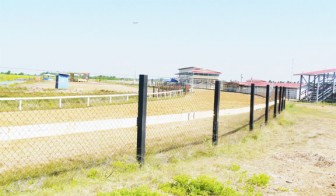
Bush Lot Farm which is dominated by rice, cattle and cash crop farmers has a welding shop, convenience/grocery store, gas station and liquor restaurant.
It also has a Guyana Telephone & Telegraph Company cell tower, the St Stephen Lutheran Church and a mandir.
The village also boasts the Kennard’s Memorial Cricket Club where Twenty/20 and limited-over matches are played.
Large-scale cash crop farmers who would reap about 50 bags of boulangers would sell their produce to hucksters with trucks.
Some residents earn their income as teachers, nurses and clerks. Persons would also come from other areas to fish in the trenches.
Sunday Stabroek caught up with a group of youths who were fishing with their cast-nets. They had come from Kildonan, two villages away.
They already had their buckets half-filled with hassar and tilapias and proudly showed this newspaper their catch which they were planning to sell.
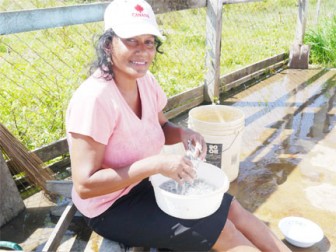
People would also visit the beach for picnics on weekends, or in the afternoons with their families and friends, while others would go to “perform religious work.”
Fourteen-year-old Nicholas Balkisson was quite willing to accompany this newspaper to the beach after his older sister, Jennifer, insisted that we must see it.
The scene was breathtaking. It was enhanced by the sight of flamingos flying above the water as if heading to the shore. When the car approached they stopped and rested in the water.
On the other side, scores of little brown birds that Nicholas said were called “plawad,” were on the sand. He tried in vain to get them to fly off together to show this newspaper how beautiful they look.
The boy had just finished picking water-coconuts for Jennifer. He burst them, poured the water into a mug and scooped out the jelly and added it. He then went to pose near the two beds of celery that he assists his parents to take care of.
Nicholas attends the JC Chandisingh Secondary School at Port Mourant but had stayed home that day because of school sports.
He would go to the beach with his parents to play games, swim and “knock birds” such as “Kalu and spiker.” He said the birds would make delicious meals. He would also accompany his father to catch tilapia, mullet and hassar from the trenches.
Race course
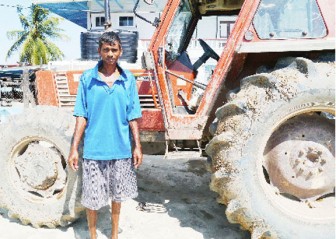
The race course, owned by the Kennard family is run by a committee comprising residents and is headed by Cecil Kennard, former Chancellor of the Judiciary.
He told this newspaper in an interview that his father, Charles Cecil Kennard, established the race course in the mid 1930s after realizing that residents did not have anything to do at the end of the rice harvesting season.
Together with the residents, the older Kennard “used shovels to make the race course” – the second oldest in the country.
Most of the residents already owned horses that they used to traverse the backdam to take care of their rice, cattle, cash-crop and coconut farms.
Kennard who serves as Chairman of the Police Complaints Authority and his six siblings took over the race course after their father died and have
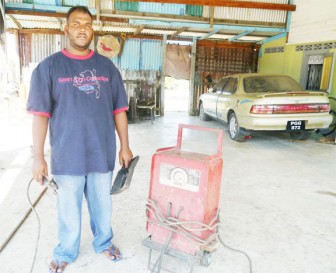
developed it over the years.
He said that initially only one major horse-race meet was held for the year and that was on Boxing Day. But that was later added to with a race in March for the Phagwah holiday, one on Arrival Day in May and another on Emancipation Day in August.
Kennard who “raced horse in my early days” was proud that “the area produced a lot of jockeys,” including former champion jockey, Edmund Sunich who grew up with the Kennard family.
The former Chancellor noted that, “Even though we have organized race-meets, the grandstand is available to any organization free of cost if they wish to hold functions for religious, educational and social purposes. The facility is also used as an exhibitions site during Agriculture Month.
His wife, Chan Kennard who is very active on the committee said the
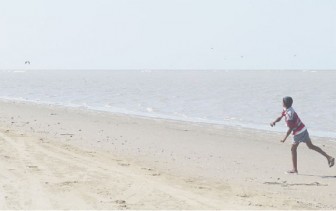
proceeds from the races are deposited in the bank and used solely for development and maintenance of the course.
They had also used it to renovate and expand the facility and to purchase its own tractor, trailer, dump truck, starting gate, water tanks and other items.
Cricket club
A younger brother, Sydney Kennard, 74, is currently serving as president of the cricket club. He said the club is also well kept and is popular for organizing major Twenty/20 and limited-over matches. The ground which was also donated to the community by Kennard’s father is protected by a zinc fence and has three pavilions. Sydney also assists in running the Canaan Home at Port Mourant, and supports three other orphanages – one at Hararuni on the Linden Highway – and six feeding programmes.
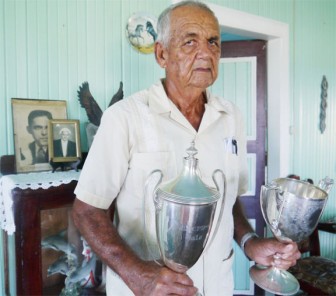
He said proudly that two inmates from the Canaan Home had been awarded scholarships to attend the University of Guyana. One of the students has completed his four-year degree programme and is waiting to graduate, while the other is in his third year. They were sponsored by the Charles Kennard Memorial Fund and by Bish Panday of P & P Associates.
The Kennard family has donated a plot of land and will fund the construction of a convention centre to facilitate the different religions. Such a centre, Sydney said, was badly needed in Berbice.
Sydney who considered himself a “rebel” in his younger days left school at an early age and was involved in farming. He was not ashamed to say that he was “an alcoholic for 25 years and I used to smoke about 40 cigarettes every day. My behaviour was terrible and my wife used to go away often and leave me but she would always come back.”
“One day,” he said, “Out of frustration with my life I decided to pick up a Bible and start reading. I would read a chapter every day and I promised myself that by the time I finished reading I must be a changed person.” And
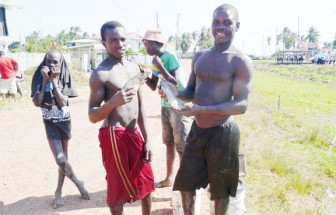
he lived up to his promise. He is happy that from an alcoholic he became “a very active Christian. I am involved in a lot of charitable work.”
Estate
The entire estate of Bush Lot Farm is owned by the Kennard family but plots of land have been sold to other persons.
Kennard said his grandfather, a British doctor, initially owned the estate and “he handed it over to my father.” His grandfather would ride around the village on a horse-drawn buggy and would stop and treat patients at homes where white flags were displayed to indicate that someone was sick.
Kennard whose job requires that he spends most of his time in Georgetown actually prefers “to relax at my family home” in the village. He visits very often “now that we have the [Berbice] bridge.”
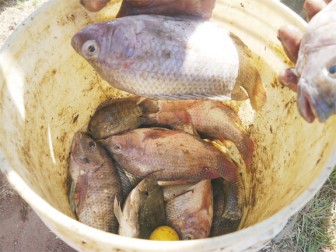
At the family home a plaque titled, “Family name history” says that the name originated from Scotland. There are also two silver trophies dating back to the year 1912 that were won by Kennard’s grandfather, Charles Poole Kennard, for horse races.
Sydney who lives obliquely opposite came over to show this newspaper around. Framed pictures of the family as well as newspaper articles with Kennard about horse-racing were also on display. Kennard is serving as a Director of the Berbice Bridge Company and is a member of the Commission of Inquiry into the July 18 Linden shootings.
Chiropractor
A resident, Rameshwar Ram, 68, spent most of his life engaged in rice, cattle and cash-crop farming but retired from that business 10 years ago. He now dedicates his time to serving as a self-trained local chiropractor. He said he has helped many persons who have suffered from conditions such as dislocated joints, pinched nerves and slipped discs to put them back on their feet. He does not fix a price for his work but would accept whatever contribution persons want to offer. He gave up farming so he can “have the time to help people…” He said that he never turns anyone away, regardless of the time because “you never know what pain they are suffering from.”
Rice farmer
Rice farmer, Pooran Ramdeo had come out of his home to purchase vegetables from a truck which also stocks fruits and ground provision, when this newspaper caught up with him. A van also passes through the village, selling similar items. Residents find this very convenient because the closest market is at Port Mourant. The vehicles would play catchy music while there are announcements about what is being sold. Residents would hear it from a distance and prepare to go out and shop.
Ramdeo had been to the backdam earlier in the day to check on his rice, and was happy that it was “A-one now. Early part [of the year] it was under threat by the weather.” He said the dam “was very bad too, but now we recover it after government provided excavators to fix it.” He was only able to plant 45 acres for this crop; another plot of rice land he owns was “bad.”
Anita Viran was sitting in her yard washing some tiny fish she called “cucu-belly.” She bought them from the Port Mourant market that morning and was planning to cook them for dinner.
A few doors away, housewife, Meena Sookrajh was selling ice to persons. Her husband, a rice farmer had gone to the backdam. Her son, Parmanand Sookrajh, resides at her home with his family. He earns his living as a mechanic, a trade he picked up from his father, and deals mostly with agricultural vehicles.
Persons told this newspaper that the negative aspect of the village is that some unemployed youths use drugs and commit minor crimes.




